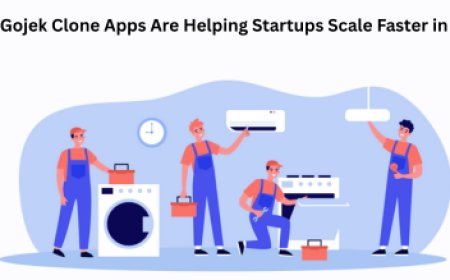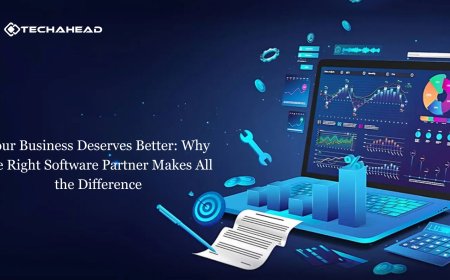Beyond the Basics: How Managed Cloud Services Are Powering Next-Gen Innovation
This is the story of how managed cloud is moving beyond the basics and powering the future of business.

Cloud computing has evolved from a disruptive technology to the very fabric of modern business. In 2025, the organizations that are thriving arent just using the cloud for storage or cost savingstheyre leveraging Managed Cloud Services to drive next-generation innovation. The cloud is now the launchpad for AI, IoT, edge computing, and digital transformation at scale. But to truly harness this potential, companies need more than just infrastructurethey need the strategic guidance and technical expertise of top-tier cloud consultants. This is the story of how managed cloud is moving beyond the basics and powering the future of business.
Managed Cloud Services: More Than Maintenance
The early days of cloud adoption were all about lift and shiftmoving workloads to the cloud to reduce costs and improve scalability. Managed services providers were primarily focused on keeping systems running and patching servers. Fast forward to 2025, and Managed Cloud Services have become a strategic enabler of business transformation.
Todays managed services go far beyond maintenance. They deliver continuous optimization, security, and innovation. Providers offer everything from automated patching and compliance to advanced analytics, AI integration, and DevOps automation. This holistic approach frees up internal IT teams to focus on strategic initiatives, while cloud consultants ensure that every workload is running at peak efficiency and aligned with business goals.
The Strategic Role of Cloud Consultants
Cloud consultants are the architects and engineers of digital transformation. Their role has expanded from technical support to strategic partnership. In 2025, the best cloud consultants are fluent in both technology and business, enabling them to bridge the gap between IT and the C-suite.
Cloud consultants work closely with business leaders to:
- Identify opportunities for innovation and automation
- Mitigate risks and ensure compliance
- Design cloud architectures that are secure, scalable, and future-proof
- Implement best practices for DevOps, AI, and data analytics
- Guide change management and upskill internal teams
This strategic partnership is what sets leading organizations apart. With the right cloud consultants, companies can move faster, innovate more boldly, and respond to market changes with agility.
Driving Innovation with Managed Cloud
AI and Machine Learning
AI is no longer a futuristic conceptits a business imperative. Managed Cloud Services now include AI-driven insights, predictive analytics, and automated decision-making. Cloud consultants help organizations deploy and scale these capabilities, unlocking new revenue streams and operational efficiencies.
For example, a logistics company might use managed cloud to implement real-time route optimization powered by machine learning, reducing delivery times and fuel costs. A retailer could leverage AI-driven demand forecasting to optimize inventory and improve customer satisfaction.
Edge Computing and IoT
As billions of devices connect to the internet, the need for real-time data processing at the edge has exploded. Managed cloud providers are enabling organizations to process and analyze data closer to the source, reducing latency and enabling faster decision-making.
Cloud consultants design architectures that balance latency, security, and scalability. In manufacturing, this might mean deploying IoT sensors on the factory floor and using managed cloud to analyze data in real time, enabling predictive maintenance and reducing downtime.
DevOps and Automation
Continuous integration and delivery (CI/CD) are now standard practice for high-performing organizations. Managed Cloud Services automate the entire software lifecycle, from code commit to production deployment. Cloud consultants ensure best practices, rapid innovation, and minimal downtime.
By automating infrastructure provisioning, testing, and deployment, companies can release new features faster and with fewer errors. This agility is critical in industries where speed to market is a competitive advantage.
Real-World Example: Smart Manufacturing
Consider a leading manufacturer that partnered with a managed cloud provider to implement an IoT-enabled production line. With the guidance of expert cloud consultants, they achieved real-time monitoring, predictive maintenance, and a 20% reduction in downtime. The result was a smarter, more agile operation that set a new industry benchmark and delivered measurable ROI.
The Future of Managed Cloud Services
Looking ahead, Managed Cloud Services will become even more intelligent, adaptive, and industry-specific. As technologies like quantum computing, 5G, and advanced AI mature, managed providers and cloud consultants will play a pivotal role in helping organizations harness these innovations.
Key trends to watch include:
- Industry-Specific Solutions: Managed services tailored to the unique needs of sectors like healthcare, finance, and manufacturing.
- Sustainability: Cloud consultants helping organizations reduce their carbon footprint through green IT practices and efficient resource utilization.
- Security and Compliance Automation: Proactive, AI-driven security and compliance checks embedded into every layer of the cloud stack.
The Human Element: Empowering Teams
While technology is the foundation, people are the catalyst for innovation. The best cloud consultants dont just implement solutionsthey empower internal teams through training, knowledge transfer, and change management. This ensures that organizations can sustain innovation long after the initial deployment.
Conclusion
Innovation doesnt happen by accidentits engineered through vision, expertise, and relentless execution. With Managed Cloud Services and the guidance of top cloud consultants, organizations can turn bold ideas into reality, outpacing the competition and shaping the future of their industries. In 2025 and beyond, the cloud is not just a platformits the engine of next-generation innovation. The question is: are you ready to move beyond the basics and lead the way?



























